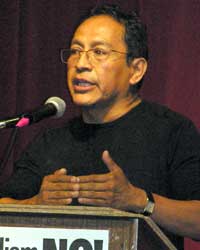Cuba’s ‘battle of ideas’
Published May 19, 2006 10:41 PM
In what the Cubans call the “battle of ideas,” it is clearer for
working people that U.S. imperialism can only offer war, destruction and
exploitation—from the extermination of Native people to taking 40 percent
of Mexico, move the border, then call Mexicans living there suddenly
immigrants.
And what was the Iraq War but a destruction of the whole
country? For anyone that still has illusions about U.S. imperialism, we see
Katrina.
In the richest country of the world, they want to cut the wages
of [Delphi] workers from $27 to $12.50 per hour. I worked for 28 years on the
floor. I am an auto worker. My co-workers don’t know if they’ll have
a pension or health care for them and their families.
Cuba calls the other
side “another world is possible.” Cuba deepened the roots of the
workers’ state. In the veins and blood of the revolution are workers.
Everything is for the workers. Eighty percent of the population owns their
house. There is free health care, free education, sports and culture. There is
no malnutrition in Cuba. Cuba has the highest life expectancy in Latin America
and the highest literacy rate. In 2000, the U.S. had 270 doctors per 10,000
inhabitants; Cuba had 582.
Another characteristic of Cuba is the
international role Cuba plays. In Angola [after helping] defeat the racist South
African Army Cuba asked for nothing in return, took not one diamond.
Three Points about Cuba:
* Cuban workers explained the neoliberal
policy: everything for corporations, for workers nothing.
* After the
collapse of the Soviet Union: Cuba kept improving education and health
care—in the worst times
* Cuba works with the social movements. The
answer to the FTAA is ALBA—the Bolivarian Alternative for Latin Amer ica,
integration of Cuba, Venezuela and Bolivia based on solidarity and cooperation
for literacy, health care and education.
We have a revolutionary
obligation to defend Cuba and Venezuela.
—Ignacio Meneses,
National Network on Cuba; U.S. Cuba Labor Exchange
Articles copyright 1995-2012 Workers World.
Verbatim copying and distribution of this entire article is permitted in any medium without royalty provided this notice is preserved.
Workers World, 55 W. 17 St., NY, NY 10011
Email:
[email protected]
Subscribe
[email protected]
Support independent news
DONATE


